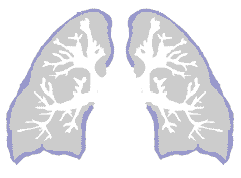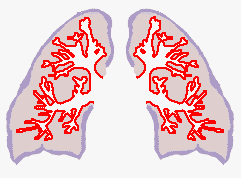Asthma
Although asthma is very common, it
is not well understood. Today, treatments for asthma are more effective and easier to
tolerate than ever. In the next 10 years, it is hoped that advances in medical research
will lead to even better treatments. This site is designed to help you learn about asthma,
its causes, and its treatment.
General Introduction
 Healthy lungs are essential to feeling good.
The lungs are the organs we use to breathe. They work by taking oxygen from the air we
breathe in and then exchanging it for carbon dioxide, a deadly waste product made by the
cells of the body. Once this exchange has taken place, we can then get rid of the carbon
dioxide by breathing it out, or exhaling. Healthy lungs are essential to feeling good.
The lungs are the organs we use to breathe. They work by taking oxygen from the air we
breathe in and then exchanging it for carbon dioxide, a deadly waste product made by the
cells of the body. Once this exchange has taken place, we can then get rid of the carbon
dioxide by breathing it out, or exhaling.
Asthma is a disease that affects the
lungs and the airways that deliver air to the lungs. It causes periodic attacks of
wheezing and difficult breathing. An asthma attack occurs when the airways become inflamed
in response to a trigger, such as dust, mold, pets, exercise, or cold weather. However,
some attacks start for no apparent reason. Triggers may inflame the airways to the lungs,
allowing disease-fighting cells to accumulate and causing swelling in the lungs. In
addition, the airways may become blocked or obstructed when the muscles surrounding the
lungs tighten or go into spasm. This keeps air from circulating freely in the lungs. Or,
mucus may clog and narrow the airways in the lungs, making breathing even more difficult.

During an asthma attack, the walls
of the airways become inflamed, and the mucous membrane covering the walls becomes swollen
with fluid. Sticky mucus fills the remaining space, making it difficult to breathe.
Because air cannot flow in and out of the lungs freely, a whistling or wheezing sound may
be heard. During severe attacks, wheezing may stop because there is too little air moving
to make any noise.
Asthma attacks can be mild,
moderate, or severe, and can last for a few minutes, a few hours, or several days. They
can occur anywhere and at any time. Many occur at night. Sometimes, there are warning
signs that an attack is about to happen, but sometimes there aren't.
Symptoms of Asthma
The symptoms of asthma can vary among people. Usually there is scratchy throat, or
tightness in the chest, followed by a cough, wheezing, or shortness of breath.
Triggers of Asthma
Although the specific things that trigger an asthma attack can vary from person to
person, some common triggers are well known. These include the following:
- Allergens (substances that people are allergic to)
- Common allergens include pollen, mold, animal hair or fur,
household dust/dust mites, cockroaches, and certain foods.
- Infections
- Both bacterial and viral infections can irritate the
airways, triggering asthma attacks.
- Sinusitis (inflammation of the nose and nasal airways)
- During a sinus infection, mucus draining into the nose,
throat, and lungs can cause asthma symptoms.
- Irritants
- Examples of irritants to the airways include strong odors
and sprays (perfumes, household cleaners, paints, and varnishes); certain chemicals like
coal, chalk dust, and talcum powder; air pollutants; tobacco smoke; changing weather
conditions (for example, cold weather).
- Smoke
- Inhaling smoke from cigarettes or fires harms the airways
and is especially hard on the airways of people with asthma. In fact, cigarette smoking is
responsible for more than half of the cases of asthma in people over 40 years of age.
- Exercise
- Although exercise is good for people with asthma, it can
trigger an asthma attack. People with asthma need to work with their doctors to prevent
asthma attacks due to exercise (certain drugs can help prevent asthma symptoms from
occurring after exercise).
- Exposure to irritants on the job
- Many cases of asthma are worsened or even caused by exposure
to vapors, dust, gases, or fumes in the workplace. This type of asthma usually improves
when the person takes a few days off from work, such as on weekends and vacations.
- Sensitivity to medications and sulfites
- About 5% to 20% of adults with asthma have attacks triggered
by sensitivities or allergies to sulfites and to medications such as aspirin, ibuprofen,
indomethacin, and naproxen. People with asthma should consult their physicians before
taking any new medication, including those available without a prescription. Sulfites are
often used to preserve foods and beverages, including tuna, foods available at salad bars,
dried apples and raisins, lemon juice, grape juice, and wine.
IMPORTANT NOTICE: In March, 1997, the United States
Food and Drug Administration issued a warning that people with asthma or allergies as to
sulfites should not eat canned white (albacore) tuna or light tuna because most canned
tuna contains sulfites, even though they are not listed on the label. If you want more
information about the sulfite content of specific tuna products, please call 800-283-1112,
a special number set up by the tuna industry.
- Emotional anxiety
- Strong emotions and nervous stress can trigger asthma in
some people. This may be due, in part, to the ability of emotions and stress to weaken the
body's defenses.
|
Allergies and Asthma
Allergy is the leading cause of asthma, and about 90% of children under the age of 10
with asthma have allergies. About 70% of people under 30 with asthma and 50% of those over
30 with asthma also have allergies. Allergy is likely to be a contributing factor to
asthma if:
- You have close relatives with allergy
(that is, a mother, father, sister, brother, aunt, uncle, or child)
- Asthma begins at a young age
- Symptoms occur or worsen with
different seasons (usually fall or spring)
- You have allergic symptoms like runny
nose, hay fever, or a skin condition called eczema
- Tests show that your blood or saliva
contains a higher than normal level of eosinophils, special cells that fight infection.
|
Fast Facts about
Asthma
- If you have asthma, you're not alone
... Asthma affects nearly 12 million people in America
- Although many people think asthma is
"no big deal," about 5,000 Americans die of asthma each year.
- African-Americans are nearly three
times as likely as whites to die of asthma
- Each year, asthma costs more than
$4.6 billion in medical care and time lost from school or work
- Asthma is the number one reason why
children miss school and the leading reason why children are admitted to the hospital
- More children than adults have
asthma. This is because some children "outgrow" their asthma attacks when they
grow up.
- Percentage of people with asthma by
age:
| All ages |
4.8% |
| 0-18 years old |
6.1% |
| 18-44 years old |
4.1% |
| 45-64 years old |
4.2% |
| 65 years or older |
5.2% |
Source: National Health Interview Survey,
National Center for Health Statistics, 1989.
Will I have to limit my activities because of asthma?
Most people with asthma can live a full and active life when they are treated and
are careful to avoid things they know can trigger their asthma. Your doctor can help you
decide whether there are times when taking medicine may help prevent an asthma attack -
for example, before exercising, on cold days, or on days when the pollution is bad or the
pollen count is high.
Will I always have asthma?
Some people outgrow asthma as they get older and no longer have attacks. Other
people are able to avoid the things that trigger an asthma attack. For many people,
however, asthma is a chronic disease that always requires care and treatment to prevent or
minimize breathing problems.
Since my child is likely to
outgrow asthma, is there a need to treat it?
About 50% of children who develop asthma between 2 and 10 years of age will
naturally outgrow the attacks. But asthma may recur when they reach their 30s or 40s.
Asthma is a serious disease, and requires treatment. It can reduce your child’s
ability to exercise and may harm his or her self-image. Since there are safe and effective
ways to treat asthma, there is no reason to allow a child to suffer its symptoms.
|

